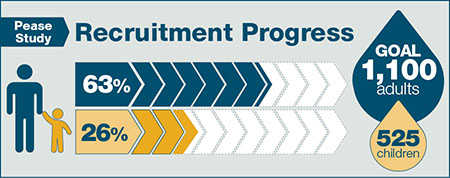PFAS Progress Newsletter — April 2020

Welcome to the first edition of the Agency for Toxic Substances and Disease Registry (ATSDR) newsletter about per- and polyfluoroalkyl substances (PFAS): PFAS Progress. We created the newsletter to keep you and your community up to date on our public health activities related to PFAS.
Some of our in-person activities have been paused to support social distancing and slow the spread of Coronavirus Disease 2019 (COVID-19), but we want to reassure you that our work continues, and we will resume community activities as soon as we can do so safely. Our goal remains for ATSDR to have the greatest and most positive impact on the health and well-being of every American.
Please visit our Website for regular PFAS updates: atsdr.cdc.gov/pfas.
To learn more about the COVID-19 response and what you can do to protect your family, visit: cdc.gov/coronavirus/2019-ncov.
Activities Updates
Exposure Assessments (EAs)
In 2019, CDC and ATSDR started EAs in communities near current or former military bases known to have had PFAS in their drinking water.
An exposure assessment tests people in a community who might have been exposed to substances such as PFAS in their environment through air, soil, or water. What we learn from the EAs aids public health professionals to help people and communities reduce or stop exposure. We have completed the recruitment and field work at our first four sites, and are analyzing data, and preparing for field work in the remaining communities. Learn more about PFAS EAs.
PFAS Exposure Assessment Technical Tools (PEATT)
CDC and ATSDR developed the PEATT to help state, local, tribal, and territorial health departments perform PFAS biomonitoring in their communities. Biomonitoring includes testing community members’ blood to determine the amount of PFAS in their bodies. Participants learn about their PFAS blood levels and how they compare to other participants’ levels in their community and nationwide. They can share their test results with their healthcare providers, who then can monitor their health.
The Pennsylvania Department of Health (PADOH) and the New York State Department of Health (NYSDOH) partnered with CDC, ATSDR, and the Association of State and Territorial Health Officials (ASTHO) to pilot test the PEATT, with the goal of improving how states and territories use it to measure and evaluate community exposure to PFAS in drinking water. See the PADOHsexternal icon and NYSDOH’sexternal icon reports and a recorded ASTHO webinarexternal icon to learn more about the findings of these assessments.
Also, learn more about the effort to understand PFAS and limit exposureexternal icon.
Pease Study
The Pease Study in Portsmouth, NH has been enrolling people to learn about the health effects of drinking water that contains PFAS. More children and adults are needed to reach its goal. Anyone who has worked or lived near the Pease International Tradeport or whose children attended Tradeport daycare may be eligible.
To find out more, please read about the study and how to enroll.

Multi-site Health Study
CDC and ATSDR have established cooperative agreements with seven partners to study the human health effects of exposure to PFAS through drinking water at locations across the nation. The Multi-site Study (MSS) established bi-weekly virtual meetings with MSS partners to share progress and exchange best practices in community engagement, communications, and evaluating study success.
Study recruitment has not yet started, but CDC and ATSDR expect it to begin in the next few months. Our goal is to enroll at least 2,100 children and 7,000 adults from communities exposed to PFAS-contaminated drinking water in the study. Please read more about the Multi-site Study and the grantee organizations.
New Resources
Per-and Substances (PFAS) in the Pease Tradeport
Public Water System
PEASE AIR FORCE BASE
PORTSMOUTH, NEWINGTON, AND
GREENLAND, NEW HAMPSHIRE
Released March 20, 2020
Evaluation of Per-and Polyfluoroalkyl Substances (PFAS)
in Public and Private Drinking Water Wells
FORMER NAVAL AIR STATION JOINT RESERVE BASE (NASJRB) AND AIR RESERVE STATION (ARS) HORSHAM, MONTGOMERY COUNTY, PENNSYLVANIA
Released March 13, 2020
Per- and Polyfluoroalkyl Substances and Your Health
PFAS Exposure Assessment Technical Tools
Tips for Preparing for Your Pease Study Appointment
Tracker: Pease Study Recruitment Process
Toxicological Profile for Perfluoroalkyls
Video: Child Life Specialist Presentation and Q&A – Part I, Part II
Video: PFAS Grand Rounds, November 19, 2019
Contact Us
Website
Phone
1-800-CDC-INFO (232-4636)
TTY 888-232-6348
Monday–Friday
8:00 a.m.–8:00 p.m. ET
Received this newsletter from a friend? Sign up now